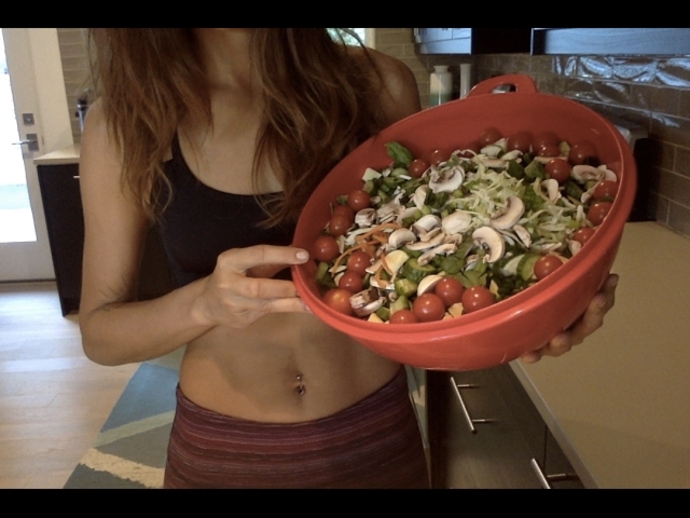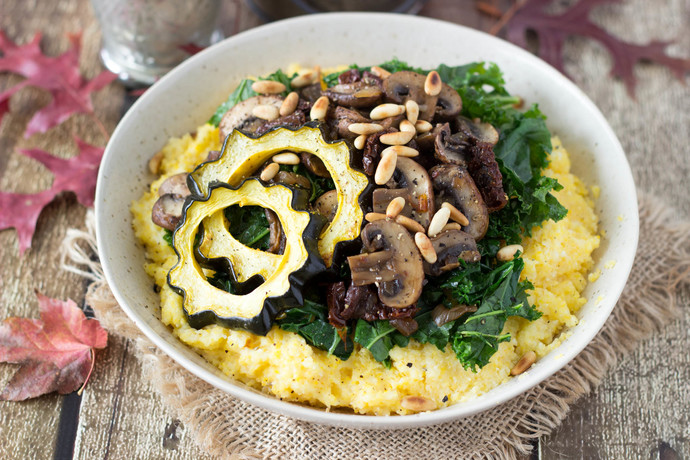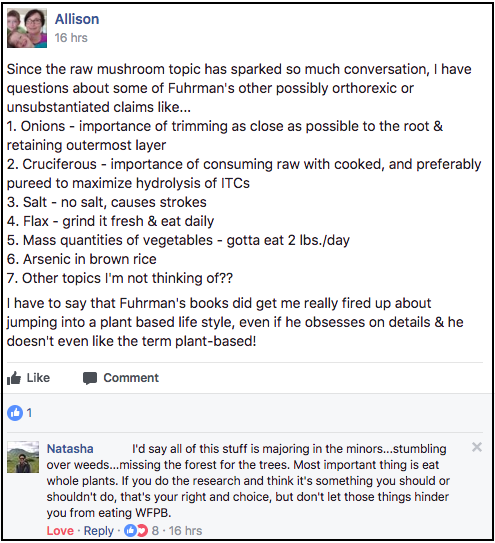Are raw mushrooms safe to eat?
Ever since I posted my monster salad video on YouTube (I make my salad once a week and it stays fresh!) I’ve been flooded with emails about mushrooms…

Apparently Dr. Fuhrman has been scaring people off raw mushrooms...
SPOILER ALERT: You don’t need to fear raw mushrooms.
You can eat them raw as long as they’re from the supermarket.
I’ll dig into the science here in a second, but before I do, I have to say I’m disappointed Dr. Greger jumped on the “you have to cook mushrooms” bandwagon too (although Greger sort-of mocks and pokes at Fuhrman in his mushroom video… so... what’s that about?)
Actually, let me say this quickly:
I have a problem with making the plant-based diet more complicated.
I have a problem making “eating healthy” harder than it has to be.
I used to stress constantly... I was completely and totally overwhelmed from all the nutritarian/plant perfection noise… I worried over every choice and ingredient...
Until one day when I asked Jeff Novick about liquid smoke—Is it safe? Should I worry that it contains polycyclic aromatic hydrocarbons (PAHs), which can be carcinogenic?
Jeff asked me to list the top 100 things I'm most worried about.
I tired long before this exercise was over, and as you can guess, the potential dangers of using a few drops liquid smoke every few months wasn’t going to make the list at all.
I have 1,001 things to worry about on any given day, some of which are REAL threats.
So when people started asking me about raw mushrooms, I said, “This isn’t something I want to spend my worry resources on” but the more the question came up, the more curious I became.
Which brought me here and my new commitment to you:
If I hear something that complicates eating healthy I’m challenging it.
I’ll report everything I find so you can make the best decision FOR YOU.
I don’t care if you eat mushrooms or not…
And I’ll respect if you come to a different conclusion after hearing all of the facts.
We all triage differently.
Circling back...

Yes.
Here’s where the ‘worry’ comes from:
Raw mushrooms may contain a naturally-occurring toxin called agaritine, which is deactivated by heat.
This is probably why Fuhrman says to cook them.
Before I talk about agaritine, let’s talk about this “cooking solution.”
According to a study Greger posted, “the absolute best method to reduce agaritine, if you boil in water for 1 hour you lose 88% of the agaritine.”
Hmm… this is confusing since Fuhrman says you only need a few minutes to dissipate all of the toxins.

Boiling for an hour is not a practical solution for me…
And either way… do these toxins “dissipate” right into the water I’m cooking them in?
Or do they “dissipate” into the air I breathe?
More questions, less answers.
As you can imagine, several people left comments begging Fuhrman to expand or reply to their concerns. For example:

His assistant left this reply, “It is a safety precaution, since a few studies have shown that there are mild toxins in raw mushrooms, and that the toxins are removed when the mushrooms are heated.”

Then why scare the shiitake out of us at all?
The Greger study that said boiling for 1 hour only reduces 88% of the agaritine (microwaving for 30 seconds loses 51%, 60% if you microwave 45 seconds) also gave me pause.
If agaritine is so dangerous that it warrants a warning from two doctors, wouldn’t ANY exposure be bad? Wouldn’t it be better to not eat mushrooms at all if this was the case?
OR is the reality that agaritine is not that dangerous, or the risk is so incredibly low to begin with, that telling people to cook is “shooting for nutritional stars” and getting a little to… inside baseball?
Let’s talk about this “toxin” agaritine.
As far as I can tell, agaritine was found to be carcinogenic in mice in a few studies, but in subsequent studies, mice were given agaritine in water every day of their lives and it didn't harm them at all, even though agaritine was a "proven" carcinogen for them.
Plus MICE ARE NOT HUMANS. This is one reason why I hate animal studies. They’re cruel and ultimately unreliable. You can’t pass the flu to your dog. Cockroaches can survive nuclear explosions. Different species react to things differently.
Human research—Is agaritine a human carcinogen?
The most recent research indicates the risk for humans is very low, that even daily consumption would not result in a measurable increase in cancer risk.
2010 HUMAN Trials “suggest that the mushrooms and mushroom extracts tested are safe and generally welltolerated. Agaritine in cultivated Agaricus bisporus has been reported in some animal model studies to be associated with potential carcinogenic effects, although this has been challenged by others and contradicted by other studies in the same animal models. A very recent study has demonstrated that agaritine purified from Agaricus blazei has direct antitumour activity against leukemic tumour cells in vitro which is in contrast to the carcinogenic activity previously ascribed to this compound. These data provide support for the conclusion of a recently published scientific critique of studies on agaritine which concluded that there is no scientifically substantiated data linking consumption of mushrooms to carcinogenicity in either animal models or humans.”
I noticed Fuhrman always references two studies to support his statement that “mushrooms need to be cooked.” One is from 1986. When I was 5. The other from 2002. It's 2017.
If you're going to make these claims Dr. Fuhrman, you have a responsibility to keep up with the research.

BUT HERE IS THE BIG KAHUNA:
Are you ready??
Agaritine also breaks down when mushrooms are refrigerated or dried.
Thus the raw mushrooms at the supermarket or salad bar OR IN YOUR FRIDGE probably contain only a fraction of agaritine anyway.
Are raw mushrooms good for you?
Mushrooms are a highly nutritious food.
There’s also no shortage of studies linking consuming mushrooms to numerous health benefits… it’s actually quite impressive to look at the volume of research and see how such a small little fungi can be so beneficial…
...but when I was looking over these studies…
I couldn’t help but notice most of them did not specify the condition of the studied mushrooms.
Meaning was the mushroom raw or cooked or dehydrated or refrigerated or frozen or left out on the lab bench for two hours before it was studied/analyzed/tested? (All of this would affect agaritine levels).
AND in studies following people who eat mushrooms, did they eat them raw or cooked or grilled or both or what?
This is all just too “inside baseball” and knit picky for me, or too “reductionist” as T. Colin Campbell might say. (His commentary on reductionism freed me from all this crazed nutrition perfectionism).
Point is, it is reasonable to assume people were eating raw mushrooms in the studies that linked consuming mushrooms to various health benefits.
Maybe cooked mushrooms are still “better” but there is a good case here that raw mushrooms aren’t the clown waiting in a sewer drain to eat children (or however that Stephen King story goes) as Dr. Fuhrman has led us to believe.
Mushrooms contain B12 and Vitamin D!
Mushrooms (especially cremini, those little brown mushrooms) provide measurable amounts of vitamin D and sometimes also significant amounts of Vitamin B12.
I wouldn’t count on eating mushrooms for meeting these requirements, but it is nice to have that plant-source defense :)

Should you eat raw mushrooms? Is it safe?
If trivial exposure to agaritine is in your 100 worries, you should avoid mushrooms altogether since the risk is always present in some capacity. You can do more reading about agaritine safety and how to reduce levels based on the latest research here.
Individuals with digestive disorders might want to cook mushrooms to make them more digestible.
Mushrooms have have tough cell walls composed of chitin. Cooking the mushrooms makes it easier to digest them and absorb their nutrients but that is true of all foods. Check out episode 4 (and also episode 3) of Shortcut to Slim for more info here.
Mushrooms are also bacteria carriers and cooking kills bacteria. In fact, if there was a good argument for cooking mushrooms, this would be it.
Lastly, some people are allergic to mushrooms and if you are allergic, you should avoid all mushrooms completely. Common allergy symptoms include nausea, vomiting, diarrhea, cramping, bloating, and abdominal pain after consumption.

Meal Mentors Wild Mushroom and Kale Polenta
How to Store Mushrooms
Leave in the little cardboard basket they come in or if you buy them loose, keep them in the refrigerator in a paper bag (loosely closed).
HOWEVER, the less surface contact they have with each other, the fresher they will stay, so if you’re not going to cook with your mushrooms right away, it’s worth spreading them out on a dish and then covering that dish with a damp towel.
Mushrooms that are purchased prepackaged can usually be stored in the refrigerator for 3-7 days. Mushrooms get slimy when they expire.
Dried mushrooms should be stored in an airtight container in your freezer, where they will stay fresh for 6-12 months.
Rehydrate them in HOT water for 10 minutes. You can use that soak water in cooking but it might be gritty.

Mushroom Substitutes in Cooking
Eggplant is the best mushroom substitute in my opinion, especially if the mushroom is being used to replace meat (i.e. beef strips) in a recipe or dish.
If the mushrooms are crumbled to replace meat, such as in a chili, crumbled cauliflower (cauliflower rice) would work better than eggplant here.
In other dishes where mushrooms are just one component, such as in a stir-fry, you can use zucchini or another vegetable you like.
For something like mushroom gravy or mushroom soup, it’s better to skip that recipe and find a different soup or gravy recipe.
GIVE SHROOMS A CHANCE FOLKS!
I hated mushrooms until a few years ago. I’m glad I kept giving them a chance. They’re one of my favorite foods now.
Finally, let’s talk about WILD mushrooms.
All bets are off here with wild mushrooms. I’ve been talking specifically about white mushrooms (and brown button mushrooms by extension) in this post.
Don’t pick and eat mushrooms yourself unless you know what you’re doing.
Many of the more exotic or “wild” mushrooms have be cooked (and some are poisonous) but if you are purchasing them at a supermarket, farmer’s market, or restaurant, you can be pretty certain they are safe to eat.
UPDATE:This comment popped up in Meal Mentor's private Facebook group and I loved what Natasha said.

NONE of the 7 things Allison listed work their way into my 100 worries. I have too much other stuff to focus my worry and time and attention on. I chop my onions without much thought. I eat vegetables cooked and raw, depending on the dish and season. Winter I like hot food. Summer I like raw foods. That seems natural. I use salt sparingly (I think everyone can be in agreement that the less sodium the better). I do not eat flax seeds and never will. I am an overeater so I do not need anyone encouraging me to shove in more food. Plus, if I measured all the vegetables and foods I eat in a day on the meal plans, it probably weighs that much. (For people trying to lose weight, please don't blinding add more food to your diet). The arsenic thing makes me roll my eyes. You could just eat other grains but it also depends on the rice and where it's from but even if you are eating the "bad rice" the risk is so low—again, is this in my 100 worries? NOPE. I'm better off with brown rice than a big mac.
Botulism:Someone commented on Facebook asking about botulism and mushrooms. Botulism is more of a concern with potatoes. Don't leave hot potatoes in foil or in an air-tight container. They need to be naked so they breathe, or refrigerate. Botulism is also a concern when it comes to canning, but this is true of any low acid vegetable not just mushrooms. Unless you're canning you probably don't need to worry about this. Read more about botulism on WHO here.














